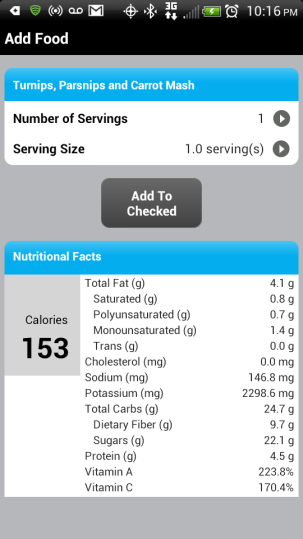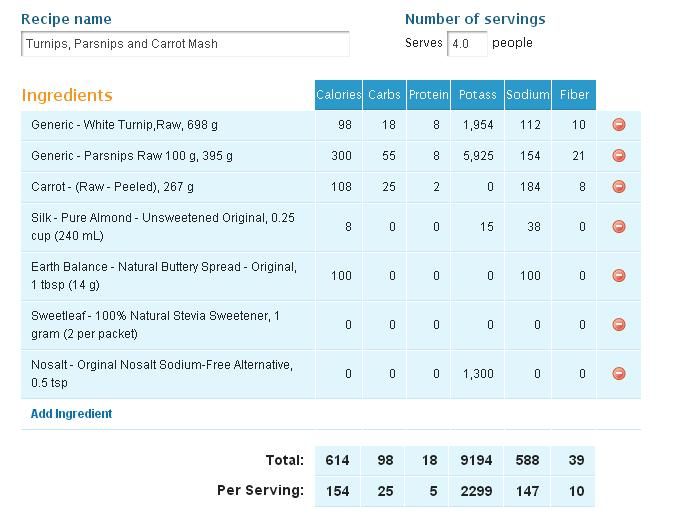150 cals 2,300mg potassium, lots of health benefits! Turnips
So many of my friends have been asking me for this recipe... I figured I'd just post it out here in case anyone else was looking for a super high potassium food that still had reasonable calories, low fat, and some awesome health benefits.
Here are the stats on it:

Here's a breakdown of the ingredients that go into it and their values:

So, now here's how to make it: I use the white turnips with the purple tips.
1. Peel turnips, carrots and parnsips. Cut off the ends. Cube the turnips and slice the carrots/parsnips. I used a few medium turnips (3 to 4), and approx 3 medium carrots and 3 medium parsnips.
2. Put it in boiling water with NoSalt. Just enough water to cover them. Bring back to boil then reduce to simmer till tender. (30 minutes approx)
3. Drain. Mash/puree in mixer bowl, with a bit of stevia to sweeten, 1 tbs Earth Balance (or other butter/margerine), 1/4 to 1/2 tsp NoSalt, add a bit of almond milk (or if you do dairy, regular milk) if needed to make creamier. Mix till reach a mashed potato texture.
4. Some people add bacon bits, but I don't... trying to keep it leaner. Heck, some people add melted bacon fat, talk about making it not so lean. LOL
Tweak it and season it to your tastes, but that's the basic recipe.
You can make this recipe with JUST the turnips... also tasty, but less sweet, more tart. You can make it less sweet by leaving out the sweetener and/or by using less carrots and parsnips. However, the parsnips are so high in potassium, I hate to cut back on them.
Here's some trivia on WHY you might want to eat turnips.... besides the awesome potassium values:
One cup of mashed turnips contains about 27 mg of vitamin C, an antioxidant. Turnips also provide most of the B vitamins, including riboflavin, thiamin, niacin, folate and pantothenic acid. One cup also has 0.2 mg of the 1.3 mg of vitamin B6 you need daily. The B vitamins help with fat, carbohydrate and protein metabolism; nervous system function; and healthy skin, hair, eyes and liver. Turnips have 76 mg of calcium per mashed cup -- about 8 percent of the recommended daily value. Turnips also contain small amounts of iron, magnesium, phosphorus, sodium, zinc, manganese and selenium. With just 51 calories per mashed cup, turnips are a lower calorie choice than an equivalent amount of boiled potatoes, with almost 200 calories. The cup of turnips provides almost 5 g of fiber.
Read more: http://www.livestrong.com/article/408477-the-health-benefits-of-turnips/#ixzz2N6VVJ7P8
Turnips are cruciferous vegetables. They contain high levels of antioxidants and phytonutrients associated with reduced risk of cancer. The glucosinolate levels in turnip greens are excellent. Research shows that plant compounds like glucosinolates help the liver process toxins, fight the effects of carcinogens and may even inhibit the growth of tumors. Turnips have great anti-inflammatory properties, which are considered key in preventing heart attacks and heart disease. They may also help the body lower cholesterol and contain excellent amounts of folate, a B-vitamin that is critical to cardiovascular health. Turnips offer a wide array of antioxidant support, including vitamin C, vitamin A, vitamin E, manganese and beta-carotene. While the roots are a great source of vitamin C, the leaf greens are chalk full of all of these antioxidants. They also offer complex phytonutrient support, which helps stimulate antioxidant activity and increases the positive results of combatting free radical activity and preventing DNA damage to cells. Turnip greens are great sources of two excellent anti-inflammatory agents: vitamin K and omega-3 fatty acids. Vitamin K is a potent regulator of the body's inflammatory response system. Research shows omega-3 fatty acids are essential building blocks of the body's inflammation system and help reduce the risk of heart disease, arthritis and other disease that may be the result of chronic inflammation. Some research suggests that glucosinolates may also help the stomach process bacteria like Helicobacter pylori. Turnips are a great source of calcium and potassium, essential minerals for healthy bone growth and helping to prevent bone diseases such as osteoporosis. Fiber helps regulate the metabolism, controls body weight and supports a healthy, active colon.
http://www.healthdiaries.com/eatthis/8-health-benefits-of-turnips.html
So, that is how I make them... any other recipes out there with good nutrient data?
Here are the stats on it:

Here's a breakdown of the ingredients that go into it and their values:

So, now here's how to make it: I use the white turnips with the purple tips.
1. Peel turnips, carrots and parnsips. Cut off the ends. Cube the turnips and slice the carrots/parsnips. I used a few medium turnips (3 to 4), and approx 3 medium carrots and 3 medium parsnips.
2. Put it in boiling water with NoSalt. Just enough water to cover them. Bring back to boil then reduce to simmer till tender. (30 minutes approx)
3. Drain. Mash/puree in mixer bowl, with a bit of stevia to sweeten, 1 tbs Earth Balance (or other butter/margerine), 1/4 to 1/2 tsp NoSalt, add a bit of almond milk (or if you do dairy, regular milk) if needed to make creamier. Mix till reach a mashed potato texture.
4. Some people add bacon bits, but I don't... trying to keep it leaner. Heck, some people add melted bacon fat, talk about making it not so lean. LOL
Tweak it and season it to your tastes, but that's the basic recipe.
You can make this recipe with JUST the turnips... also tasty, but less sweet, more tart. You can make it less sweet by leaving out the sweetener and/or by using less carrots and parsnips. However, the parsnips are so high in potassium, I hate to cut back on them.
Here's some trivia on WHY you might want to eat turnips.... besides the awesome potassium values:
One cup of mashed turnips contains about 27 mg of vitamin C, an antioxidant. Turnips also provide most of the B vitamins, including riboflavin, thiamin, niacin, folate and pantothenic acid. One cup also has 0.2 mg of the 1.3 mg of vitamin B6 you need daily. The B vitamins help with fat, carbohydrate and protein metabolism; nervous system function; and healthy skin, hair, eyes and liver. Turnips have 76 mg of calcium per mashed cup -- about 8 percent of the recommended daily value. Turnips also contain small amounts of iron, magnesium, phosphorus, sodium, zinc, manganese and selenium. With just 51 calories per mashed cup, turnips are a lower calorie choice than an equivalent amount of boiled potatoes, with almost 200 calories. The cup of turnips provides almost 5 g of fiber.
Read more: http://www.livestrong.com/article/408477-the-health-benefits-of-turnips/#ixzz2N6VVJ7P8
Turnips are cruciferous vegetables. They contain high levels of antioxidants and phytonutrients associated with reduced risk of cancer. The glucosinolate levels in turnip greens are excellent. Research shows that plant compounds like glucosinolates help the liver process toxins, fight the effects of carcinogens and may even inhibit the growth of tumors. Turnips have great anti-inflammatory properties, which are considered key in preventing heart attacks and heart disease. They may also help the body lower cholesterol and contain excellent amounts of folate, a B-vitamin that is critical to cardiovascular health. Turnips offer a wide array of antioxidant support, including vitamin C, vitamin A, vitamin E, manganese and beta-carotene. While the roots are a great source of vitamin C, the leaf greens are chalk full of all of these antioxidants. They also offer complex phytonutrient support, which helps stimulate antioxidant activity and increases the positive results of combatting free radical activity and preventing DNA damage to cells. Turnip greens are great sources of two excellent anti-inflammatory agents: vitamin K and omega-3 fatty acids. Vitamin K is a potent regulator of the body's inflammatory response system. Research shows omega-3 fatty acids are essential building blocks of the body's inflammation system and help reduce the risk of heart disease, arthritis and other disease that may be the result of chronic inflammation. Some research suggests that glucosinolates may also help the stomach process bacteria like Helicobacter pylori. Turnips are a great source of calcium and potassium, essential minerals for healthy bone growth and helping to prevent bone diseases such as osteoporosis. Fiber helps regulate the metabolism, controls body weight and supports a healthy, active colon.
http://www.healthdiaries.com/eatthis/8-health-benefits-of-turnips.html
So, that is how I make them... any other recipes out there with good nutrient data?
0
Replies
-
My dad always grows turnips so I grew up around them, but my mom never cooked them. We always ate them raw! This recipe may get me to try to cook them. Thanks for posting!0
-
Yummy Dawn! Way to go on a new way to prepare something we probably should eat.

Monica0 -
Gee, all those folks wanting to know the recipe and now hardly a comment. :-(0
-
BUMP - thanks for posting
 This is right up my alley
This is right up my alley  0
0 -
Bump Thanks for the info.0
-
Thanks for the recipe, I can't wait to try it this weekend.0
-
bump0
-
Fabulous!!0
-
thank you so much!! I'm really deficient in potassium and really looking to bump up my intake! I'm going to try this tomorrow, really appreciate it!!0
-
Wow, we just finished with the last of the turnips I grew in the garden. I knew they were good for you, but didn't know they were this good for you! Yay! I actually still have a couple jars of pickled turnip slices in the fridge :-)0
-
You know, I'm not gonna lie, I suck at cooking. I am more of a microwave kinda girl. But I saw this recipe and was interested because I am always looking for higher potassium levels. Once I saw the ingredients, I had to google what the heck a parsnip was. Now, I can't wait to try one! Sounds fantastic.
Just wanted to say thank you for introducing me to parsnips! :happy:0 -
Thanks for posting!!
With that much potassium, how could I not try this!0 -
Wow, we just finished with the last of the turnips I grew in the garden. I knew they were good for you, but didn't know they were this good for you! Yay! I actually still have a couple jars of pickled turnip slices in the fridge :-)
I've never had them pickled. How do you make those?0 -
I mash rutabaga and carrot together with just a little butter or margarine. So yummy! Do not add milk, ruins it.
 0
0 -
Thank you for posting this
 0
0 -
Thnak you for posting this recipe. just today I was wondering how to increase potassium intake with more than having a babana!0
-
Not to rain on the parade, but those numbers are for raw, not cooked. Potassium numbers should be around half what you listed, since the cooking process destroys some of the nutrients. Still really high, and very much worth eating though! Thanks for the recipe. Going to try it out next week.0
-
I am going to have to try this!0
-
Fab! Thank you so much for posting this. I love mash with cauliflower, carrots and sweet potatoes. This one looks worht including into my receipies list on here.0
-
Thanks for posting i will try this ' sounds great for health0
-
I tested it... You can divide it into servings & freeze it. It thaws & heats just fine.0
This discussion has been closed.
Categories
- All Categories
- 1.4M Health, Wellness and Goals
- 398.1K Introduce Yourself
- 44.7K Getting Started
- 261K Health and Weight Loss
- 176.4K Food and Nutrition
- 47.7K Recipes
- 233K Fitness and Exercise
- 462 Sleep, Mindfulness and Overall Wellness
- 6.5K Goal: Maintaining Weight
- 8.7K Goal: Gaining Weight and Body Building
- 153.5K Motivation and Support
- 8.4K Challenges
- 1.4K Debate Club
- 96.5K Chit-Chat
- 2.6K Fun and Games
- 4.8K MyFitnessPal Information
- 12 News and Announcements
- 21 MyFitnessPal Academy
- 1.5K Feature Suggestions and Ideas
- 3.2K MyFitnessPal Tech Support Questions


















